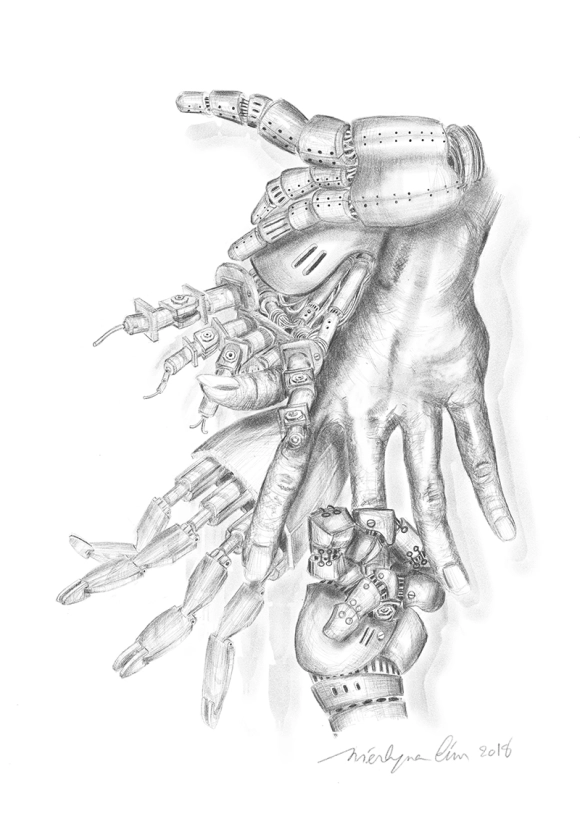The Diary from 2073: Living in a Digital Nightmare
by Sofia Ali
Dear Diary,
The year is 2073. I came across a discussion post I wrote in a class I took in the fourth year of my undergraduate degree. The post was about what I believed the digital world would look like fifty years in the future. I thought we would have flying cars or talking fridges. I was wrong. This has me reminiscent of how different the digital landscape was back in 2023. We now live in what I would call a digital nightmare. The digital landscape in the year 2073 has caused societal downfall. Unchecked technological advancement and society’s reliance on technology have led to a world controlled by artificial intelligence (AI), filled with human isolation and the absence of ethics. Looking at the bias present in AI, the connection between our digital and social world, the relationship between technology and humanity, and how it leads us to human isolation, it is clear how we have entered societal downfall. I wish I could go back and tell my past self what I know now. I wrote this diary entry so that I can look back at it in the future and see what has changed.

I remember back in 2023, AI was on the rise. It was the next big thing. Who could have thought how destructive it could be? We should have known. Dr. Joy Buolamwini’s work was a wake-up call to society. It was one example of the discrimination present within algorithms and AI that affected all spheres of the public realm (Kantayya, 2020). While working on AI facial recognition technologies, Dr.Buolamwini found that these algorithms often could not detect darker-skinned individuals or women accurately (Kantayya, 2020). This was a milestone discovery. It uncovered more about society than just the mere fact that AI and algorithms could be discriminatory. This discovery showed how society and technology cannot be separated (Kantayya, 2020). The social aspects of the world were integrated into the technological aspects (Kantayya, 2020). Looking back at history, the people who have had the privilege to work on these technologies have been predominantly white men (Kantayya, 2020). Therefore, technologies such as facial recognition AI cater to them (Kantayya, 2020). Langdon Winner looks at how design choices of technologies reflect political and social values and can establish power or authority (Winner, 1980, p.134). This shows how much our social sphere gets tied into the digital realm. The exclusion of darker-skinned individuals and women from this technology is just one example of Winner’s argument that design choices of technological artifacts show power and authority. You can see who has power in society to see who is included in the design of facial recognition technology. Now, looking at where we are now in 2073, the increased diversity in facial recognition technologies and AI being able to detect people of colour and women have led to increased surveillance and discrimination. These technologies are being used against minorities. We did not learn from our previous discoveries how life’s social and technological parts are tied together. Therefore, the same technology that was made inclusive to minorities is being used against them. This is just one-way unchecked technological advancement and reliance on technology have led to the societal downfall. We can see through this lack of ethics.
Douglas Rushkoff, a media theorist, once said that technology has an anti-human agenda (Rushkoff, 2019). He caught on to how technological tools and platforms were being created to help corporations, not to help people’s lives (Rushkoff, 2019). It was to extract value from people in forms such as time, data, consciousness and choice-making (Rushkoff, 2019). He coined early on that the digital landscape is becoming anti-human because of the biases of corporate growth, where companies are fueled by capital (Rushkoff, 2019).
That is what has happened to the digital landscape in 2073. It is almost like he knew exactly what would happen in the future. Rushkoff was able to identify the relationship between technology and humanity. He discussed how the internet could be compared to a drug, where you have to be mindful of the way you use it (Rushkoff, 2019). The only issue is, that society did not recognize the power technology had. This unchecked technological advancement and society’s blind reliance on technology is what led to societal downfall. As Rushkoff said back in 2019, when something is invented, venture capital is what will dictate what happens with the new technology (Rushkoff, 2019). Even back then, we could see the appearance of the digital realm as capital-based rather than human-centred (Rushkoff, 2019). It was about what made the most money, not what helped people. In the current time, 2073, the reality has become that society is more worried about how programs affect the operational system of their computer when they install it instead of how the operational system will affect their lives when they are using it (Rushkoff, 2019). The relationship between technology and humanity has become unbalanced and oversaturated. Society has become dependent on technology instead of consuming it as a healthy diet.
Even back in 2019, Rushkoff mentioned that anything in digital technology is a substitute for something one can do in real life (Rushkoff, 2019). If only we had listened back then. This shows the clear link that has always been present between humanity and technology. This over-dependence on technology has led to isolation. Dating back to 2001, Fisher and Wright discussed that “in addition to the loss of strong bonds among members of society, many critics agree that the Internet will limit connections between central and peripheral actors in society” (Fisher & Wright, 2006). It can be said that computer and networking technology produce transformations in every corner of social life (Fisher & Wright, 2006). Now, in 2073, this is our only reality. Society’s blind reliance and dependence on technology now fosters human connection and interaction.
Humans have no reason to interact as technology now serves every purpose. The more dependent we have become on technology, the more there was isolation among humans. Real-life experience and sustenance were always necessary. We knew this back then, but 2073’s digital landscape can prove that corporations do not have individuals’ best interests at heart. Even back in 2019, Rushkoff mentioned that social media is filled with algorithms from slot machines (Rushkoff, 2019). They know how to hypnotize people. Now, in 2073, they have mastered it. There is no separation between the real world and the digital world. The digital world has become our real world. Human isolation has occurred as society is fully reliant on these unchecked technologies to operate. This has led to societal downfall as the corporations behind this are not interested in what humans want and need. Power has been placed into the hands of these big companies whose only goal is to make as much money as possible. As I previously mentioned, with the bias present in AI, we can see that a lot can be revealed about society in technology. Touching on Winner’s argument that technological artifacts show power and authority, the increased reliance on digital technology has caused power to fall into the wrong hands. As mentioned before, history has shown us that people with privilege could advance certain technologies, which excluded certain groups. There will always be greater themes present in our technology as we cannot separate the social realm from the digital realm.
I wish we could go back in time and use these discoveries and lessons to avoid this digital nightmare. If we had used Dr. Joy Buolamwini’s work for more than making AI more inclusive. We could have used her work to truly tackle the issue at hand, where our social bias will permanently be embedded into technology. The inclusivity in technology we added was used against the minority groups that were being excluded. Early on, we found that the design of technology gives power. Now, in 2073, this power is in the wrong hands. It is in the hands of corporations that are driven by capital and not human needs. Through looking at the history of AI excluding minority groups and how society and technology are linked, it can be seen how AI has been advanced to continue to put marginalized communities at a disadvantage. Our social realm will always be tied to our technological realm. This stresses the importance of ethics, which you can see a lack of in 2073. The digital landscape in the year 2073 is now filled with human isolation. Technology has taken over humanity due to society’s overreliance on it. We have reached a societal downfall. This unchecked advancement and society’s reliance on technology has led to this world controlled by AI with the absence of ethics and filled with human isolation. If we had taken what we had learned throughout history, we could prevent what is happening today. If I could go back, I would read this diary entry to myself.
References
Fisher, D. R., & Wright, L. M. (2006). On utopias and dystopias: Toward an understanding of the discourse surrounding the internet. Journal of Computer-Mediated Communication, 6(2), 1https://doi.org/10.1111/ j.1083-6101.2001.tb00115.x
Kantayya, S. (2020). Coded bias. 7th Empire Media.
Rushkoff, D. (2019, May 10). Is Our Technology Future Utopian or Dystopian?
[Podcast; interview]. In David Pakman Show.
Winner, L. (1980). Do artifacts have politics? Daedalus, 121-136.
Author’s bio:

Sofia Ali recently graduated with High Distinction from Carleton University’s Bachelor of Public Affairs and Policy Management program, specializing in Communication Technologies and Regulation.
She continues to work in Policy and Communications in the professional world.